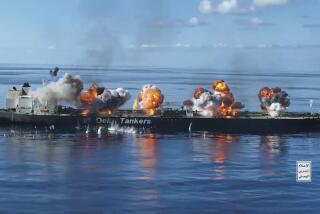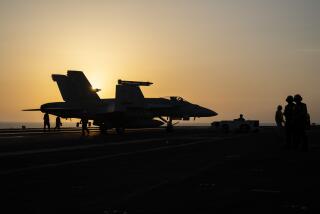Kuwaiti Decoy Reportedly Hit by Iran Missile
- Share via
KUWAIT — Iranian forces fired a Silkworm missile at Kuwait on Monday, but it exploded harmlessly in waters off the main oil loading terminal, the Defense Ministry said.
Shipping sources said the Chinese-made missile hit a decoy barge off Kuwait’s Al Ahmadi offshore terminal at the head of the Persian Gulf.
The Iranians did not acknowledge firing the missile, the seventh reported to have hit Kuwait’s waters or territory this year. Three launched in October hit two tankers and a supertanker loading dock.
In other developments Monday:
--At the lower end of the gulf, a Singapore-flag tanker with a load of naphtha from Saudi Arabia was sinking after flames swept “from end to end,” shipping and naval sources said. The ship was hit Sunday by rocket-propelled grenades fired from Iranian speedboats.
--Lloyd’s Shipping Intelligence Unit of London confirmed that an Iraqi air raid badly damaged a Cypriot-flag tanker near Iran’s huge Kharg Island oil terminal in the northern gulf. It said the 238,909-ton Actinia had taken on a full load at Kharg before it was attacked twice within five hours last Friday.
--Tarik Aziz, the Iraqi foreign minister, arrived in New York for talks with Secretary General Javier Perez de Cuellar on U.N. efforts to bring about a cease-fire in the war. Perez de Cuellar met last week with Mohammed Larijani, deputy foreign minister of Iran.
Iran accuses Kuwait of supporting Iraq in the seven-year-old war. The Silkworms have a range of about 50 miles and are believed fired from launchers roughly that far away, on captured territory of Iraq’s Faw Peninsula.
The missile fired Monday apparently was aimed at the Al Ahmadi terminal’s Sea Island supertanker loading facility, which resumed partial operation 10 days ago after being seriously damaged in a Silkworm strike Oct. 22.
Among the ships served by the terminal are the 11 Kuwaiti tankers that were given U.S. registration and American flags last summer so that U.S. Navy escort ships could protect them.
More to Read
Sign up for Essential California
The most important California stories and recommendations in your inbox every morning.
You may occasionally receive promotional content from the Los Angeles Times.










